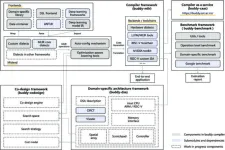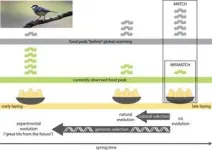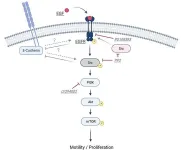(Press-News.org) Co-design, that is, designing software and hardware simultaneously, is one way of attempting to meet the computing-power needs of today’s artificial intelligence applications. Compilers, which translate instructions from one representation to another, are a key piece of the puzzle. A group of researchers at the Chinese Academy of Sciences summarized existing compiler technologies in deep learning co-design and proposed their own framework, the Buddy Compiler.
The group’s review paper was published June 19 in Intelligent Computing, a Science Partner Journal.
Although others have summarized optimizations, hardware architectures, co-design approaches, and compilation techniques, no one has discussed deep learning systems from the perspective of compilation technologies for co-design. The researchers studied deep learning from this angle because they believe that “compilation technologies can bring more opportunities to co-design and thus can better achieve the performance and power requirements of deep learning systems.”
The review covers five topics:
The history of deep learning and co-design
Deep learning and co-design now
Compilation technologies for deep learning co-design
Current problems and future trends
The Buddy Compiler
The history of deep learning and co-design
Since the 1950s, neural networks have gone through many rises and falls leading up to today's explosive growth of deep learning applications and researches. Co-design began in the 1990s and has since then been adopted in various fields, progressing from manual work to computer-aided design and ultimately becoming a complex process involving modeling, simulation, optimization, synthesis, and testing. Since 2020, a network model called a transformer has seen great success: ChatGPT is a chatbot built using a “generative pre-trained transformer.” Current AI applications like ChatGPT are reaching a new performance bottleneck that will require hardware-software co-design again.
Deep learning and co-design now
The breakthrough of deep learning comes from the use of numerous layers and a huge number of parameters, which significantly increase the computational demands for training and inference. As a result, relying solely on software-level optimization, it becomes challenging to achieve reasonable execution times. To address this, both industry and academia have turned to domain-specific hardware solutions, aiming to achieve the required performance through a collaborative effort between hardware and software, known as hardware-software co-design. Recently, a comprehensive system has emerged, comprising deep learning frameworks, high-performance libraries, domain-specific compilers, programming models, hardware toolflows, and co-design techniques. These components collectively contribute to enhancing the efficiency and effectiveness of deep learning systems.
Compilation technologies for deep learning co-design
There are two popular ecosystems that are used to build compilers for deep learning: the tensor virtual machine, known as TVM, and the multi-level intermediate representation, known as MLIR. These ecosystems employ distinct strategies, with TVM serving as an end-to-end deep learning compiler and MLIR acting as a compiler infrastructure. Meanwhile, in the realm of hardware architectures customized for deep learning workloads, there are two primary types: streaming architecture and computational engine architecture. Hardware design toolflows associated with these architectures are also embracing new compilation techniques to drive advancements and innovations. The combination of deep learning compilers and hardware compilation techniques brings new opportunities for deep learning co-design.
Current problems and future trends
With performance requirements increasing too fast for processor development to keep up, effective co-design is critical. The problem with co-design is that there is no single way to go about it, no unified co-design framework or abstraction. If several layers of abstraction are required, efficiency decreases. It is labor-intensive to customize compilers for specific domains. Unifying ecosystems are forming, but underlying causes of fragmentation remain. The solution to these problems would be a modular extensible unifying framework.
The Buddy Compiler
The contributors to the Buddy Compiler project are “committed to building a scalable and flexible hardware and software co-design ecosystem.” The ecosystem’s modules will include a compiler framework, a compiler-as-a-service platform, a benchmark framework, a domain-specific architecture framework, and a co-design module. The latter two modules are still in progress.
The authors predict continued development of compilation ecosystems that will help unify the work being done in the rapidly developing and somewhat fragmented field of deep learning.
The authors of the review are Hongbin Zhang, Mingjie Xing, Yanjun Wu, and Chen Zhao of the Institute of Software, Chinese Academy of Sciences.
END
How computers and artificial intelligence evolve together
A review of compiler technologies for deep learning co-design
2023-06-30
ELSE PRESS RELEASES FROM THIS DATE:
Safety and immunogenicity of SYS6006 were evaluated in healthy adults after three doses of COVID-19 inactivated vaccines
2023-06-30
The COVID-19 pandemic, caused by severe acute respiratory syndrome coronavirus 2 (SARS-CoV-2), has resulted in more than 600 million confirmed cases and 6.5 million deaths worldwide. mRNA-based vaccines have emerged as a leading platform for COVID-19 protection and are extensively investigated in basic and clinical trials. SYS6006 (CSPC Pharmaceutical Group) is a newly investigational COVID-19 mRNA vaccine encoding a full-length S protein sequence of the prototype SARS-CoV-2 strain and incorporating the key mutations of main epidemic variants. In March 2023, it has been authorized for emergent use in China by the national medicinal ...
Engineered approach to remove protein aggregates from cells
2023-06-30
Protein aggregates accumulate during aging and are linked to neurodegenerative diseases like Alzheimer’s, Parkinson’s or Huntington’s disease. A new study by the Nyström lab at Gothenburg University, in collaboration with the Max Planck Institute for Biology of Ageing in Germany, describes a novel, engineered approach that makes protein aggregates amenable to spatial manipulations in both budding yeast and human cells.
Many neurodegenerative diseases like Alzheimer’s, Parkinson’s or Huntington’s disease are associated with the aggregation of misfolded proteins ...
BGI Genomics leads in industry to obtain BSI ISO 37301 Compliance Management System Certification
2023-06-30
As businesses become increasingly global, changes are also taking place at an extraordinary pace. Compliance is critical for large economies, industry regulations, and enterprise operations.
BGI Genomics prioritizes compliance management and strictly follow laws, regulations, and international practices while conducting business globally. BGI Genomics recently completed the rigorous evaluation of BSI, a major worldwide standard, testing, and certification authority. It was awarded the GB/T 35770-2022/ISO 37301:2021 Compliance Management System accreditation, making it the first enterprise in the industry to do so. ...
The device that can remotely and accurately monitor breathing: as tested on cane toads
2023-06-30
Constant monitoring of vital health signs is needed in a variety of clinical environments such as intensive care units, for patients with critical health conditions, health monitoring in aged care facilities and prisons, or in safety monitoring situations where drowsiness can cause accidents.
This is now mostly achieved via wired or invasive contact systems. However, these are either inconvenient or, for patients with burns or for infants with insufficient skin area, are unsuitable.
Scientists at the University of Sydney Nano Institute and the NSW Smart Sensing ...
Rising monkey and pig populations pose human disease risk
2023-06-30
Exploding populations of wild pigs and macaque monkeys in Southeast Asia are threatening native forests and disease outbreaks in livestock and people, according to research led by The University of Queensland.
Dr Matthew Luskin, from UQ’s School of the Environment, and his team collated and analysed species population data from across the region, some of it collected with a network of cameras.
“Macaques and wild pigs are taking over Southeast Asia’s disturbed forests,” Dr Luskin said.
“Humans are largely to blame for this by altering forests with logging ...
KOSÉ and Niigata University develop a three-dimensional epithelial model that reproduces the human lip area
2023-06-30
Niigata, Japan - KOSÉ Corporation (Headquarters: Chuo-ku, Tokyo; President: Kazutoshi Kobayashi) has developed in collaborative research with Professor Kenji Izumi and his colleagues at Niigata University Graduate School of Medical and Dental Sciences (Faculty of Dentistry) a three-dimensional epithelial model that reproduces the human lip area from the oral mucosa to the lips and surrounding skin, using cell culture.
The lips are one of the most important elements that determine the impressions of the face, and they are also an area where many people suffer from problems, ...
Revolutionizing regenerative medicine: Unlocking the healing power of oral keratinocytes
2023-06-30
Niigata, Japan—Scientists have made significant progress in understanding the signals involved in regulating oral keratinocyte cell motility and proliferative capacity, offering new insights into potential pharmacological manipulation for regenerative medicine. A recent study, published in FEBS Open Bio, elucidated the role of the epidermal growth factor (EGF) and its downstream signaling cascade in controlling the behavior of oral keratinocytes.
Oral keratinocytes, which play a crucial role in the formation of the oral mucosa epithelial cell sheet, have long been enigmatic in terms of their signaling ...
Long COVID is not a single condition, study finds
2023-06-30
Long COVID is not a single condition, and should not be treated as such, according to new data collected in nationwide study released May 31 in the Open Forum of Infectious Diseases.
The study looked at persistent symptoms experienced by patients with COVID-19 both at three- and six-month intervals. In all, 5,963 patients participated in the study, with 4,504 of the participants testing positive for COVID-19 and 1,459 testing negative. Many of the participants, 2,000 in all, came from King County through the University of Washington School of Medicine.
The four major symptom categories for people who tested positive for COVID-19 included:
Minimal ...
Loneliness linked with elevated risk of cardiovascular disease in patients with diabetes
2023-06-30
Sophia Antipolis, 30 June 2023: Loneliness is a bigger risk factor for heart disease in patients with diabetes than diet, exercise, smoking and depression, according to research published today in European Heart Journal, a journal of the European Society of Cardiology (ESC).1
“The quality of social contact appears to be more important for heart health in people with diabetes than the number of engagements,” said study author Professor Lu Qi of Tulane University School of Public Health and Tropical Medicine, New Orleans, US. “We should not downplay the important of loneliness ...
TGI-led research finds climate change, increasing population put Kenya at risk of famine
2023-06-30
ST. LOUIS - Research published in Outlook on Agriculture has shown that the population relative to available climate-suitable areas in Kenya has increased, posing a threat to the country’s economy and food security.
The study, “Spatial changes to climate suitability and availability of agropastoral farming systems across Kenya (1980-2020),” was published online on May 29.
The research team analyzed Kenya’s farming systems and climate zones between 1980-2020. Over that time, the population ...
LAST 30 PRESS RELEASES:
For solar power to truly provide affordable energy access, we need to deploy it better
Middle-aged men are most vulnerable to faster aging due to ‘forever chemicals’
Starving cancer: Nutrient deprivation effects on synovial sarcoma
Speaking from the heart: Study identifies key concerns of parenting with an early-onset cardiovascular condition
From the Late Bronze Age to today - Old Irish Goat carries 3,000 years of Irish history
Emerging class of antibiotics to tackle global tuberculosis crisis
Researchers create distortion-resistant energy materials to improve lithium-ion batteries
Scientists create the most detailed molecular map to date of the developing Down syndrome brain
Nutrient uptake gets to the root of roots
Aspirin not a quick fix for preventing bowel cancer
HPV vaccination provides “sustained protection” against cervical cancer
Many post-authorization studies fail to comply with public disclosure rules
GLP-1 drugs combined with healthy lifestyle habits linked with reduced cardiovascular risk among diabetes patients
Solved: New analysis of Apollo Moon samples finally settles debate about lunar magnetic field
University of Birmingham to host national computing center
Play nicely: Children who are not friends connect better through play when given a goal
Surviving the extreme temperatures of the climate crisis calls for a revolution in home and building design
The wild can be ‘death trap’ for rescued animals
New research: Nighttime road traffic noise stresses the heart and blood vessels
Meningococcal B vaccination does not reduce gonorrhoea, trial results show
AAO-HNSF awarded grant to advance age-friendly care in otolaryngology through national initiative
Eight years running: Newsweek names Mayo Clinic ‘World’s Best Hospital’
Coffee waste turned into clean air solution: researchers develop sustainable catalyst to remove toxic hydrogen sulfide
Scientists uncover how engineered biochar and microbes work together to boost plant-based cleanup of cadmium-polluted soils
Engineered biochar could unlock more effective and scalable solutions for soil and water pollution
Differing immune responses in infants may explain increased severity of RSV over SARS-CoV-2
The invisible hand of climate change: How extreme heat dictates who is born
Surprising culprit leads to chronic rejection of transplanted lungs, hearts
Study explains how ketogenic diets prevent seizures
New approach to qualifying nuclear reactor components rolling out this year
[Press-News.org] How computers and artificial intelligence evolve togetherA review of compiler technologies for deep learning co-design






